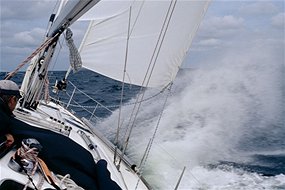RSS (Latest Ask an Expert web feed) Ask an Expert
Wednesday, 11 January 2017
Are your 'sea legs' in your brain or your muscles?
The best defence against seasickness is the ability to adapt to the motion of a boat or a ship. But just how does the body get 'sea legs'?
 Lightning, tornadoes and mice: the science of bushfires
Lightning, tornadoes and mice: the science of bushfires
Friday, 6 January 2017
 Why the latest sunset time doesn't fall on the longest day of the year
Why the latest sunset time doesn't fall on the longest day of the year
Tuesday, 20 December 2016
 What is a tsunami and how are they monitored?
What is a tsunami and how are they monitored?
Tuesday, 22 November 2016
 What flower colours do birds and bees prefer?
What flower colours do birds and bees prefer?
Wednesday, 16 November 2016
Explore more
Ask an Expert
 Three household products you could cut to help the environment
Three household products you could cut to help the environment
Some chemical substances in our home are unnecessary and can have devastating consequences for the environment - we asked an expert to identify the top three chemicals we should reduce or cut out completely.
 Where is the search for extraterrestrial life up to?
Where is the search for extraterrestrial life up to?
Despite the headlines, no alleged signals from ET have ever been confirmed. Yet far from being put off their search, scientists are stepping it up.
 Rosetta: how to crash a spacecraft into comet 67P
Rosetta: how to crash a spacecraft into comet 67P
The Rosetta spacecraft is on its final mission - a kamikaze crash landing that will target a specific point on comet 67P. We ask an expert what this 14-hour journey will look like.
 Can high tides during a full moon trigger earthquakes?
Can high tides during a full moon trigger earthquakes?
A new study suggests there is a link between high tides produced during a full moon and an increase in large earthquakes, but how solid is the evidence?
 Do our cells grow in size as we grow?
Do our cells grow in size as we grow?
Cells are the fundamental units that make up our body, so what happens to them when we grow? That depends upon the type of cell.
 What happens in our brains when we hallucinate?
What happens in our brains when we hallucinate?
You don't have to have schizophrenia or take LSD to have a hallucination, and they don't always have to be scary either.
 Why don't most Australian trees lose their leaves in autumn?
Why don't most Australian trees lose their leaves in autumn?
Autumn is synonymous with falling leaves in the northern hemisphere, but Australia only has a handful of native deciduous trees. Is it too hot for deciduous trees to have evolved, or is there another reason?
 What is the Goldilocks Zone and why does it matter in the search for ET?
What is the Goldilocks Zone and why does it matter in the search for ET?
The Goldilocks Zone refers to the habitable zone around a star where the temperature is just right - not too hot and not too cold - for liquid water to exist on an planet.
 Fusion vs fission: clean, green nuclear technologies explained
Fusion vs fission: clean, green nuclear technologies explained
How close are we to having nuclear plants that fit the clean, green bill? What are the different technologies and what do they offer?
 What is El Nino and why does it have so much influence over our weather?
What is El Nino and why does it have so much influence over our weather?
Why does El Nino matter? And are we headed for a super-El Nino?
 Why didn't we just use the Hubble telescope to take photos of Pluto?
Why didn't we just use the Hubble telescope to take photos of Pluto?
Why is the Hubble able to get extremely detailed images of galaxies and nebulae, millions of light years away, but when it comes to taking pictures of Pluto, it shows up as a blurry ball?
 Five things we would need for people to go to Mars
Five things we would need for people to go to Mars
In the new film The Martian, marooned astronaut Mark Watney has to survive the Red Planet's harsh environment. Just how close to reality is a manned mission to Mars?
 Will spring leaves keep coming out earlier?
Will spring leaves keep coming out earlier?
Over the past century, as spring has become warmer, leaves on deciduous trees around the world have been emerging earlier and earlier, but will this trend continue?
 Why did humans evolve blue eyes?
Why did humans evolve blue eyes?
What determines the colour of blue eyes? And when, and why, did they evolve?
 What would the Milky Way galaxy look like from across the universe?
What would the Milky Way galaxy look like from across the universe?
What would the Milky Way galaxy look like if you looked back at it from a distant part of the universe? And, what section of the galaxy can we see in the night sky from Earth?








